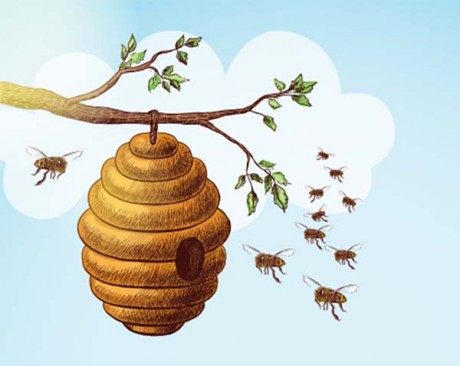Thank the hardworking bees
From apples to zucchini and honey, too
By Leah Chester-DavisBeekeeping schools are abuzz from January through March throughout North Carolina. The bees are on a bit of hiatus getting ready for the spring honey flow, and beekeepers are getting their equipment ready or training new beekeepers.
North Carolina leads the way when it comes to its Master Beekeeper program, with nearly 3,000 beekeepers and 60 county beekeeping associations, making it the largest of its kind in the U.S. The classes and the local associations are valuable resources for both seasoned and beginning beekeepers. Experienced beekeepers serve as mentors, and beginners often have a chance to get hands-on experience in working with bees to determine if it's a hobby they want to pursue.
Beekeeping is fascinating. It is also beneficial. According to Bob Blackwelder, a beekeeper of 43 years and an instructor of beekeeping in Cabarrus, Rowan and Stanley counties, honeybees are efficient, hard workers. They certainly have a big impact on gardens and crops. We can thank honeybees for the wide variety of foods available to us. Without them, our food choices would be limited.
Among the many crops pollinated by these hard workers in North Carolina are apples, blueberries, cucumbers, melons, peaches, squash, strawberries and watermelon. Other food crops we enjoy from other states include oranges, lemons, limes, broccoli, carrots, avocados and almonds. And there are many more.
In addition to the benefits they provide for food production and ornamental gardening efforts, bees produce a sweet product. Honey is one of the many rewards of beekeeping. Local honey is available at many farmers markets statewide. About $15 million of honey is produced each year in North Carolina.
The color and flavor of honey differs depending on the bees' nectar source. According to the National Honey Board, there are more than 300 unique kinds of honey in the U.S A fascinating fact about bees, explained Blackwelder, is that they are loyal to the flower. For example, if they are introduced to a patch of clover they will stick with it until the flower is gone, then they will switch to another flower.
Some of the honey varietals in North Carolina are sourwood, tulip poplar and clover.
Honey is a versatile food item that can be used in dips, spreads, marinades, sauces and salad dressings. Try this recipe for Grilled Apples With Cheese and Honey.
As we start 2015, it seems appropriate to borrow from the Jewish holiday Rosh Hashanah, which has a tradition that a drizzle of honey signifies hopes for a sweet new year. To learn more about beekeeping schools, visit ncbeekeepers.org.
About the Author
After many years with NC State University, Leah Chester-Davis opened her own communications business. She got her start as a 4-H’er giving small kitchen appliance demonstrations for her electric cooperative.-
Share this story:



